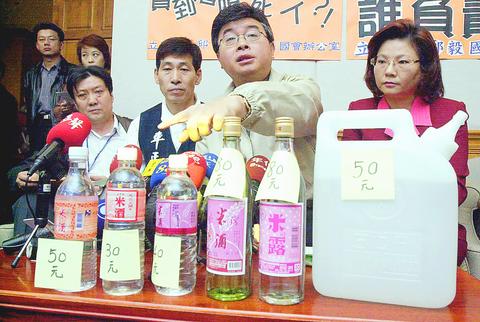In a bid to battle the problem of counterfeit rice wines that are thought to have killed several people in Ilan County, the Executive Yuan yesterday established a task force to crack down on bootleg rice wines.
Local governments are currently in charge of investigating counterfeit wines, while the Ministry of Finance is responsible for issuing brewing licenses and quality control.

PHOTO: CHIANG YING-YING, TAIPEI TIMES
The Cabinet is studying the possibility of reducing taxes on distilled liquor, including rice wine.
The tobacco and wine tax of the rice wine is NT$150 per liter and will go up to NT$185 per liter in 2004.
Statistics made available by the National Police Administration yesterday showed that between January and November the police found 158 people suspected of illegally making 44,000kg of fake rice wines, including finished and semi-finished products, with an estimated market price of NT$90 million.
As of Sept. 30, nearly 300 people have been indicted for illegally manufacturing wine and tobacco.
Addressing a press conference at the Executive Yuan yesterday afternoon, Cabinet Spokesman Chuang Shuo-hang (
"Since the government's job is to ensure public health and safety, we don't allow unlicensed brewers to manufacture poor quality wines and jeopardize public health," Chuang said.
According to Susan Chang (
The Taiwan Tobacco & Liquor Corp -- formerly the government alcohol monopoly Taiwan Tobacco and Wine Board -- will join local health departments to offer free rice-wine tests.
The service will be available today and run through to the end of the year.
According to Hwang Ing-san (
"If we find any fake wine, we'll report it and let the judicial system take over," Hwang said.
Those who manufacture fake wines and cause physical damage to, or death of, an individual will face prosecution, said Vice Minister of Justice Hsieh Wen-ting (謝文定).
The Cabinet is considering more severe sentences for those unauthorized to manufacture, import or sell wines.
The Cabinet is also considering raising the bounties for investigators and individuals to encourage them to report cases.
In a bid to help consumers differentiate real wine from fraudulent bottles, the Cabinet is also considering establishing an identification system.
Meanwhile, the Ministry of Finance yesterday requested the manufacturer of the Verolin brand rice wine to immediately stop production and sale of its products and recall those already in the market within seven days.
The ministry also called on the public to stay clear of the product, saying that it contains excessive levels of methanol, which is believed to be the component that caused the deaths in Ilan County.

Alain Robert, known as the "French Spider-Man," praised Alex Honnold as exceptionally well-prepared after the US climber completed a free solo ascent of Taipei 101 yesterday. Robert said Honnold's ascent of the 508m-tall skyscraper in just more than one-and-a-half hours without using safety ropes or equipment was a remarkable achievement. "This is my life," he said in an interview conducted in French, adding that he liked the feeling of being "on the edge of danger." The 63-year-old Frenchman climbed Taipei 101 using ropes in December 2004, taking about four hours to reach the top. On a one-to-10 scale of difficulty, Robert said Taipei 101

Nipah virus infection is to be officially listed as a category 5 notifiable infectious disease in Taiwan in March, while clinical treatment guidelines are being formulated, the Centers for Disease Control (CDC) said yesterday. With Nipah infections being reported in other countries and considering its relatively high fatality rate, the centers on Jan. 16 announced that it would be listed as a notifiable infectious disease to bolster the nation’s systematic early warning system and increase public awareness, the CDC said. Bangladesh reported four fatal cases last year in separate districts, with three linked to raw date palm sap consumption, CDC Epidemic Intelligence

Taiwanese and US defense groups are collaborating to introduce deployable, semi-autonomous manufacturing systems for drones and components in a boost to the nation’s supply chain resilience. Taiwan’s G-Tech Optroelectronics Corp subsidiary GTOC and the US’ Aerkomm Inc on Friday announced an agreement with fellow US-based Firestorm Lab to adopt the latter’s xCell, a technology featuring 3D printers fitted in 6.1m container units. The systems enable aerial platforms and parts to be produced in high volumes from dispersed nodes capable of rapid redeployment, to minimize the risk of enemy strikes and to meet field requirements, they said. Firestorm chief technology officer Ian Muceus said

MORE FALL: An investigation into one of Xi’s key cronies, part of a broader ‘anti-corruption’ drive, indicates that he might have a deep distrust in the military, an expert said China’s latest military purge underscores systemic risks in its shift from collective leadership to sole rule under Chinese President Xi Jinping (習近平), and could disrupt its chain of command and military capabilities, a national security official said yesterday. If decisionmaking within the Chinese Communist Party has become “irrational” under one-man rule, the Taiwan Strait and the regional situation must be approached with extreme caution, given unforeseen risks, they added. The anonymous official made the remarks as China’s Central Military Commission Vice Chairman Zhang Youxia (張又俠) and Joint Staff Department Chief of Staff Liu Zhenli (劉振立) were reportedly being investigated for suspected “serious